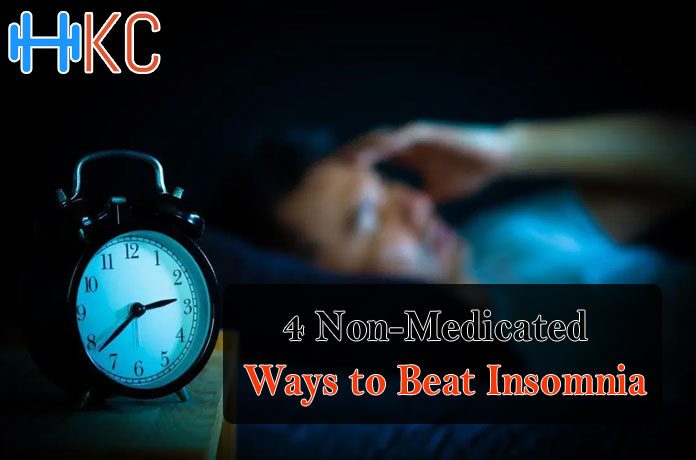4 Non-Medicated Ways to Beat Insomnia
Struggling to get a good night’s sleep? You may not realise, but most people experience problems with sleep and many people suffer from insomnia at some point in their life.
There are various causes of insomnia which can include physical conditions, psychological conditions (such as depression or anxiety) or a combination of the two.
The following are signs that you have insomnia:
- you find it difficult to go to sleep;
- you often wake up in the night;
- you lie awake at night;
- you wake up early and find it hard to go back to sleep;
- you feel tired after you have woken up;
- even if you are tired, you cannot sleep during the day;
- you feel tired and irritable in the daytime;
- concentrating during the day is hard because you are tired.
If you suffer with insomnia, here are 4 ways to make getting to sleep easier without the need for medication:
#1. Lighting is vital
Lighting plays a key role in helping us get to sleep. After all, this is the reason you sleep when it is dark and are awake when it is light. If the lights are too bright when you are getting ready for bed, you will struggle to sleep as it keeps your mind active by releasing the hormone cortisol.
Cortisol stimulates the brain and tells us it’s time to get up. When it is dark, the hormone melatonin is released, which tells our body it’s time to sleep. Bear in mind that the lighting should therefore be more subtle at bedtime, so try using a bedside lamp or dimmer switch and if you do your teeth just before getting into bed, maybe use the hallway light rather than the bright bathroom light so that you are not being exposed to a bright light again just before bed.
There should be no televisions or screens of any kind in your bedroom. It is a place to sleep, so make sure that if you like playing games, checking Facebook or texting friends, screens are off and away at least an hour before bedtime.
In the same way as lighting, this can keep your brain active and make getting to sleep far more difficult. Bedrooms should be relaxing places for sleep and sex only, so make sure it is decorated in a calming way and is free from clutter if possible.
#2. Food and drink
Make sure you have finished eating in good time before starting to get ready for bed and bear in mind that certain foods and drinks can have a detrimental effect on sleep.
Avoid sugary snacks and drinks as well as caffeine for four to six hours before bedtime and remember that drinking alcohol before bed can not only affect your sleep cycle but can also mean more trips to the toilet in the night and causes dehydration. Aim to give your body time to process the alcohol you have consumed by at least an hour per unit and have alcohol-free days to give yourself chance to have a better night’s sleep.
Try foods that help promote sleep such as dairy products, kiwi fruit, bananas, oats or sour cherry juice. Cheese and crackers are a good option; just remember to avoid hot chocolate because of the high sugar content in the cocoa or drinking chocolate! Similarly, porridge is good for you before bedtime, but don’t be tempted to add chocolate spread for the same reason. You could try adding banana and honey instead.
Try not to eat too close to bedtime, though, as this can also make it more difficult for you to sleep. Give your body time to digest your food adequately.
#3. Bedtime routine
Avoid taking naps in the afternoon, as this can affect your ability to sleep well at night.
Give yourself time to wind down by reading a book or doing a similarly calming activity an hour before you go to sleep. Why not try colouring or playing cards?
You should aim to go to sleep and wake at the same time every day, even on weekends, if possible, as this will help you regulate your body clock. For those of you who work shifts, try to group your shifts together if you can and come up with a sleep routine that works for you.
If you struggle to get to sleep or need help getting back to sleep, there are various tricks that can help:
- keep your bedroom at a lower temperature and make sure your bed is comfortable. This means a comfortable mattress and pillows;
- try putting essential oils for sleep in a diff-user, in a relaxing bath or in a spray to act as a pillow mist. Having a bath can help with sleep as it is the process of the body temperature dropping after the bath that helps make it easier to fall asleep;
- try putting on some relaxing music, such as meditation music, yoga music or just some soothing sounds. Apps like Headspace and Calm can also be helpful but bear in mind that the screen could have a negative effect on sleep, although some of the sleep apps come with a darker “blue screen” which is more conducive to sleep;
- if you are still finding it difficult, try doing something extremely boring such as counting backwards from 1000 or reciting something easy to memorize. There was a gentleman interested in Science who recited the periodic table every night to help him get to sleep; it worked for him! Find something that will work for you.
#4. Positive mindset
It is generally thought that exercise can help you get a better night’s sleep. It can certainly help you feel happier. Try joining a local class or doing some exercise at home. Gentle exercise such as yoga or Pilates often includes some form of meditation or relaxation at the end which may help clear your mind of the day’s activities. Take care to exercise during the day and not too close to bedtime, otherwise it can then prevent you from sleeping.
If you suffer from anxiety, a good idea is to keep a notebook and pen by your bed so that you can jot down anything that is worrying you or that needs doing the next day. Do this before you go to bed, and if you wake in the night you can add anything to your “list”.
This should help you to stop worrying about things at night as you are allowed to list any worries but must then leave them in your notebook and find time the next day to go through your list and make sure you have dealt with well any worries and things to do in advance of next bedtime. With children, this can be replaced with a “worry jar” where concerns and things to do are written on slips of paper and placed in the jar to be dealt with at an agreed time the next day. It is a good idea for a parent to help a child with this; they could even decorate their jar.
Before you go to sleep, thing about something positive; it could be something that happened to you during the day, a compliment someone gave you or just a feeling of being grateful for what you have. If you are feeling angry, think of something funny or silly as it is impossible to be cross when you are laughing. Go on, try it!
















